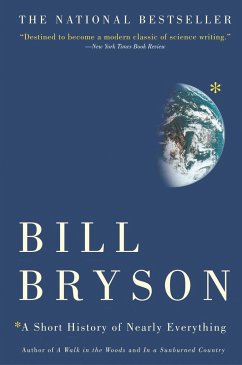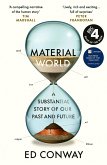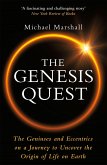Bill Bryson is one of the world's most beloved and bestselling writers. In "A Short History of Nearly Everything, he takes his ultimate journey-into the most intriguing and consequential questions that science seeks to answer. It's a dazzling quest, the intellectual odyssey of a lifetime, as this insatiably curious writer attempts to understand everything that has transpired from the Big Bang to the rise of civilization. Or, as the author puts it, ..."how we went from there being nothing at all to there being something, and then how a little of that something turned into us, and also what happened in between and since." This is, in short, a tall order. To that end, Bill Bryson apprenticed himself to a host of the world's most profound scientific minds, living and dead. His challenge is to take subjects like geology, chemisty, paleontology, astronomy, and particle physics and see if there isn't some way to render them comprehensible to people, like himself, made bored (or scared) stiff of science by school. His interest is not simply to discover "what we know but to find out "how we know it. How do we know what is in the center of the earth, thousands of miles beneath the surface? How can we know the extent and the composition of the universe, or what a black hole is? How can we know where the continents were 600 million years ago? How did anyone ever figure these things out? On his travels through space and time, Bill Bryson encounters a splendid gallery of the most fascinating, eccentric, competitive, and foolish personalities ever to ask a hard question. In their company, he undertakes a sometimes profound, sometimes funny, and always supremely clear and entertaining adventurein the realms of human knowledge, as only this superb writer can render it. Science has never been more involving, and the world we inhabit has never been fuller of wonder and delight.

Reiseautor Bill Bryson erforscht die Wissenschaft
Europa, Afrika, Australien, die USA – Bill Bryson war schon fast überall und immer hat er seine Reisen sehr erfolgreich in Büchern vermarkten können. Vieles erfährt der Leser über das bereiste Land, mehr aber noch über Mr Bryson selbst. Besonders auffällig ist des Autors Talent, überall seltsame Leute zu treffen, wobei er in deren Gesellschaft sehr gut zu passen scheint. Mit seiner Vorliebe für menschliche Eigenarten ist es wohl folgerichtig, dass sich Bryson für sein jüngstes Werk drei Jahre lang auf den Heimatkontinent der Exzentriker begeben hat: die Wissenschaft. „A short history of nearly everything” heißt das bislang nur auf englisch erschienene Buch. Die Scham über seinen wissenschaftlichen Analphabetismus, sagt Bryson, war der Anlass, sich auf diesen Trip zu begeben. Was er an Skurrilitäten entdeckte, muss ihm jedoch sehr vertraut erschienen sein.
Der brillante schwedische Chemiker Carl Scheele etwa hatte die fatale Neigung, alle Substanzen, die er erforschte, einer Geschmacksprobe zu unterziehen. 1786 wurde er tot an seinem Arbeitsplatz gefunden. Unbeschadet kam dagegen Sir Isaac Newton davon. Er schob aus reiner Neugier einmal eine lange Nadel so weit wie möglich zwischen seinen Augapfel und die Augenhöhle, „just to see what would happen”. Aber auch lebende Forschergrößen, die er besucht hat, kann Bryson zitieren, und diese persönlichen Gespräche machen sein Buch lebendig. Fachlich bietet Bryson zwar – wie der Titel verspricht – fast alles über Kosmos, Erde, Geologie über Chemie, Physik und Biologie, tatsächlich aber nicht viel Neues. Zudem hat sich so mancher Fehler eingeschlichen – oft ist daran wohl Brysons Lust an der allzu griffigen Formulierung schuld. Etwa wenn er über die Mitochondrien, die Energie produzierenden Zellbestandteile höherer Organismen, schreibt. Diese stammen von Bakterien ab und wurden vor mehr als einer Milliarde Jahren in die Zellen aufgenommen. Das lässt sich unter anderem daran sehen, dass sie über eigenes genetisches Material verfügen. „In short, they keep their bags packed”, heißt es dazu bei Bryson, was schlicht falsch ist. Nur noch ein Bruchteil der ursprünglichen genetischen Ausrüstung ist übrig, so dass Mitochondrien außerhalb der Zelle keinesfalls überleben könnten.
Beim Internet-Buchhandel Amazon steht „A short history of nearly everything” seit Wochen in den Top 20 der Verkaufsliste. Wie die enthusiastische Fanpost schließen lässt, hat Brysons bekannter Name dem Buch viele Leser gebracht, die sich sonst nicht für Wissenschaft interessieren. Bestenfalls profitiert das für Wissenschaftsliteratur sonst unzugängliche Publikum von Brysons Buch nicht nur intellektuell, sondern übernimmt auch des Autors Begeisterung für die Wunder der Natur. Ein paar fachliche Ausrutscher wird man da in Kauf nehmen können.
SUSANNE WEDLICH
BILL BRYSON: A Short History Of Nearly Everything. Broadway Books, New York 2003. 545 S., 27,50 US-Dollar.
SZdigital: Alle Rechte vorbehalten - Süddeutsche Zeitung GmbH, München
Jegliche Veröffentlichung exklusiv über www.diz-muenchen.de









